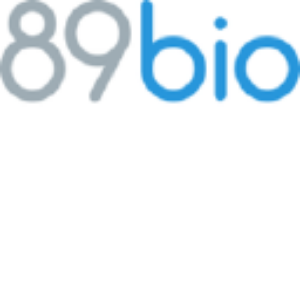89bio Presents Updated Clinical Data from Positive Phase 1b/2a Study of BIO89-100 in NASH at AASLD’s The Liver Meeting® 2020
Rhea-AI Summary
89bio, Inc. (Nasdaq: ETNB) announced updated positive data from its Phase 1b/2a study of BIO89-100, a treatment for nonalcoholic steatohepatitis (NASH). The study demonstrates significant reductions in liver fat, ALT levels, and triglycerides across various dosing groups with favorable tolerability. Notably, 88% of patients achieved a ≥30% reduction in liver fat. The company plans to initiate a Phase 2b study in early 2021, emphasizing its commitment to addressing NASH's unmet medical needs.
Positive
- 88% of patients achieved a ≥30% reduction in liver fat.
- Significant reductions in ALT (up to 44%) and triglycerides noted.
- Plans to initiate a Phase 2b study in early 2021.
Negative
- None.
News Market Reaction 1 Alert
On the day this news was published, ETNB gained 7.18%, reflecting a notable positive market reaction.
Data tracked by StockTitan Argus on the day of publication.
– Data demonstrated compelling efficacy profile and favorable tolerability with weekly and every two-week dosing –
– Consistent results and baseline characteristics across biopsy confirmed and phenotypic NASH patients –
– Positive, highly significant correlation between relative changes in liver fat reduction and ALT –
SAN FRANCISCO, Nov. 13, 2020 (GLOBE NEWSWIRE) -- 89bio, Inc. (Nasdaq: ETNB), a clinical-stage biopharmaceutical company focused on the development and commercialization of innovative therapies for the treatment of liver and cardio-metabolic diseases, today announced updated data from its positive Phase 1b/2a study of BIO89-100, a long-acting glycoPEGylated FGF21 analog, in patients with nonalcoholic steatohepatitis (NASH). Previously disclosed topline data demonstrated reductions in liver fat with concurrent beneficial effects on lipids and other metabolic parameters, as well as favorable tolerability, with both weekly and every two-week dosing. New analyses from the trial will be presented today in a late-breaking poster (abstract #LP34) at The Liver Meeting Digital Experience™ 2020 of the American Association for the Study of Liver Diseases (AASLD).
“I believe that these data highlight BIO89-100’s robust potency in reducing liver fat as assessed by MRI-PDFF over a 12-week period. New analyses of the data demonstrate the strong and significant correlation between relative reductions in MRI-PDFF and serum ALT in patients treated with BIO89-100. Responses on these two measures have been shown to translate into histology improvement and potentially a clinically meaningful benefit in patients with NASH,” said Rohit Loomba, MD, MHSc, Director of the UC San Diego NAFLD Research Center and Director of Hepatology at UC San Diego School of Medicine. “We saw a remarkable consistency of results across the sub-populations of biopsy-confirmed NASH and phenotypic NASH (PNASH) patients enrolled in the trial. Baseline characteristics were similar across these sub-populations and BIO89-100 treatment resulted in similar reductions in liver fat, ALT, and triglycerides.”
“We are moving forward with a comprehensive clinical development program designed to build upon the promising results from BIO89-100’s Phase 1b/2a trial, which includes plans to initiate a Phase 2b study in the first half of 2021 and an open-label paired biopsy histology cohort in the near-term. Today’s data are encouraging for these planned studies as we believe they demonstrate BIO89-100’s compelling risk-benefit profile as a leading FGF21 analog in a class that could become a key part of the NASH treatment paradigm,” said Rohan Palekar, Chief Executive Officer, 89bio.
A copy of the poster presentation, entitled “BIO89-100 Demonstrated Robust Reductions in Liver MRI-PDFF, Favorable Tolerability and Potential for Every 2 Weeks Dosing in a Phase 1b/2a Placebo-Controlled, Double Blind, Multiple Ascending Dose Study in NASH,” is available on the AASLD website and is also available for download via the 89bio website.
The data presented show:
- Similar reductions in liver fat, ALT and triglycerides between biopsy-confirmed NASH and PNASH patients treated with BIO89-100 and, importantly, their similar baseline characteristics underscored the consistency across these two sub-populations of patients enrolled in the trial.
- Pharmacokinetics of BIO89-100 demonstrated dose proportional PK.
- Positive and highly significant correlation (r=0.540, p<0.001) between relative reduction in liver fat by MRI-PDFF and ALT reduction at Week 13.
- Treatment with BIO89-100 (N=81) resulted in significant reductions in liver fat on MRI-PDFF at Week 13 across all dose groups vs. placebo, with up to
70% and60% relative reductions for the 27mg-QW and 36mg-Q2W dose groups vs. placebo, respectively (p<0.001). - Significant proportion of patients responded to therapy with up to
88% and71% of patients achieving a ≥30% and a ≥50% reduction in liver fat vs. baseline, respectively. - Significant benefit in markers of liver injury and fibrosis, with up to
44% reduction in ALT and a 35 Units/Liter (U/L) decrease in patients with high ALT was observed. - Significant improvements were also observed in triglycerides. Reductions in TGs was more pronounced in patients who had higher levels of TGs at baseline.
- Improvements were also noted across the spectrum of metabolic marker data vs. placebo for the 27mg QW dose group including HOMA-IR, glucose, HbA1c, weight (p<0.05) and adiponectin (p<0.001).
- BIO89-100 was well-tolerated across all doses with no deaths or serious adverse events related to treatment and a low incidence of treatment-related adverse events (TRAEs) that occurred in ≥
10% of patients. - Low frequency of gastrointestinal (GI) related adverse events was observed with a profile for BIO89-100 that was similar to placebo. Low rates of diarrhea (
9.5% vs.11.1% for placebo) and nausea (4.8% vs.11.1% for placebo) and importantly, no vomiting were reported in BIO89-100 treated patients. No hypersensitivity AEs, few mild injection site reaction events, no tremor and no adverse effects on heart rate or blood pressure were observed.
About NASH
NASH is the most advanced stage of nonalcoholic fatty liver disease (NAFLD). It is a complex metabolic disorder that causes fat buildup in the liver, as well as inflammation and eventually fibrosis, and it can worsen to cirrhosis and liver failure. NASH affects more than 16 million adults in the United States, and by 2030 its prevalence is predicted to increase by 63 percent. The exact cause of NASH is unknown, but it is commonly found in people with obesity and type 2 diabetes. While there are currently no approved treatments, the biopharmaceutical industry is actively involved in addressing this unmet medical need.
About the Phase 1b/2a Study
This clinical study was a multicenter, randomized, double-blind, placebo-controlled, multiple ascending dose-ranging trial. It was designed to assess the safety, tolerability, and PK properties of BIO89-100 as well as change in liver fat measured by MRI-PDFF and key biomarker assessments in patients with biopsy-proven NASH with fibrosis or patients with phenotypical NASH (PNASH). PNASH was defined as patients with steatosis greater than
About BIO89-100
BIO89-100 is a glycoPEGylated analog of FGF21 being developed for the treatment of NASH. 89bio has optimally engineered BIO89-100 using a proprietary glycoPEGylation technology to balance efficacy and longer dosing interval. Recent Phase 1b/2a data show BIO89-100 demonstrated a favorable safety and tolerability profile and robust reductions in liver fat and key lipid markers when dosed weekly (QW) or once every two weeks (Q2W). BIO89-100 is also being developed for the treatment of severe hypertriglyceridemia (SHTG) and is currently in a Phase 2 trial.
About 89bio
89bio is a clinical-stage biopharmaceutical company focused on the development and commercialization of innovative therapies for the treatment of liver and cardio-metabolic diseases. The company’s lead product candidate, BIO89-100, is a specifically engineered glycoPEGylated analog of FGF21. BIO89-100 is being developed for the treatment of nonalcoholic steatohepatitis (NASH) and severe hypertriglyceridemia (SHTG). 89bio is headquartered in San Francisco with operations in Herzliya, Israel.
Forward-looking Statements
Certain statements in this press release may constitute "forward-looking statements" within the meaning of the federal securities laws, including, but not limited to, the therapeutic potential and clinical benefits of BIO89-100, the safety and tolerability of BIO89-100, future clinical development plans for BIO89-100, including the Phase 2b study and open-label paired biopsy histology cohort and the anticipated timing for such plans. Words such as "may," "might," "will," "objective," "intend," "should," "could," "can," "would," "expect," "believe," "design," "estimate," "predict," "potential," "develop," "plan" or the negative of these terms, and similar expressions, or statements regarding intent, belief, or current expectations, are forward looking statements. While 89bio believes these forward-looking statements are reasonable, undue reliance should not be placed on any such forward-looking statements, which are based on information available to us on the date of this release. These forward-looking statements are based upon current estimates and assumptions and are subject to various risks and uncertainties (including, without limitation, those set forth in 89bio's filings with the SEC), many of which are beyond 89bio's control and subject to change. Actual results could be materially different. Risks and uncertainties include: expectations regarding the timing and outcome of 89bio’s initiation of the next trial in NASH; 89bio’s ability to execute on its strategy; positive results from a clinical study may not necessarily be predictive of the results of future or ongoing clinical studies; the effect of the COVID-19 pandemic on 89bio’s clinical trials and business operations, and the impact of general economic, health, industrial or political conditions in the United States or internationally; and other risks and uncertainties identified in 89bio's Annual Report on Form 10-K for the year ended December 31, 2019 and its Quarterly Report on Form 10-Q for the quarter ended September 30, 2020 and other subsequent disclosure documents filed with the SEC. 89bio claims the protection of the Safe Harbor contained in the Private Securities Litigation Reform Act of 1995 for forward-looking statements. 89bio expressly disclaims any obligation to update or alter any statements whether as a result of new information, future events or otherwise, except as required by law.
Investor Contact:
Ryan Martins
Chief Financial Officer
investors@89bio.com
Media Contact:
Peter Duckler
773-343-3069
pduckler@w2ogroup.com








